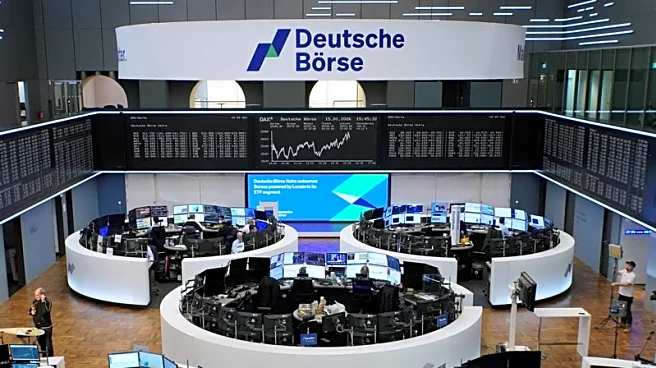What's Happening?
During a Premier League match between Manchester United and Brighton & Hove Albion, a controversial incident occurred involving Manchester United's Amad Diallo and Brighton's Maxim De Cuyper. In the 15th
minute, Diallo was seemingly tripped by De Cuyper inside the penalty area. Referee Anthony Taylor did not award a penalty, allowing play to continue. The Video Assistant Referee (VAR), Michael Oliver, reviewed the incident and confirmed the on-field decision, citing that De Cuyper had made contact with the ball during the challenge. The VAR protocol requires a 'clear and obvious' error for intervention, which Oliver determined was not present in this case.
Why It's Important?
The decision not to award a penalty has significant implications for Manchester United, as it could have altered the outcome of the match. VAR decisions are often scrutinized for their impact on game results and team standings in the league. This incident highlights ongoing debates about the effectiveness and consistency of VAR in football, particularly regarding subjective calls like penalty decisions. The ruling reinforces the importance of the 'clear and obvious' error standard in VAR interventions, which can affect team strategies and fan perceptions of fairness in officiating.
What's Next?
As VAR continues to play a crucial role in Premier League matches, teams and officials may seek further clarity on its application, especially in subjective scenarios like penalty appeals. Manchester United and other clubs might push for more transparency in VAR processes to ensure consistent and fair decision-making. The Premier League may consider reviewing its VAR protocols to address concerns raised by teams and fans, potentially leading to adjustments in how referees and VAR officials interpret and apply the rules during matches.
Beyond the Headlines
The incident underscores the broader challenges of integrating technology into sports officiating. While VAR aims to enhance accuracy, it also introduces complexities in interpreting the rules, which can lead to contentious outcomes. This situation may prompt discussions on the ethical dimensions of technology in sports, including the balance between human judgment and technological assistance. Long-term, the evolution of VAR could influence how other sports leagues adopt similar technologies, shaping the future of sports officiating globally.











